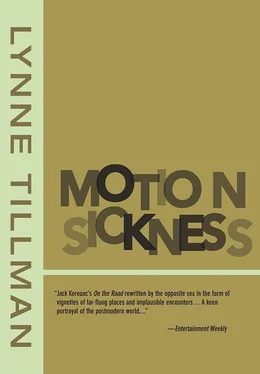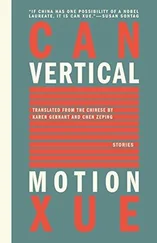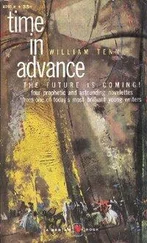Huub tells me that in Amsterdam everyone speaks three or four languages. Changing languages is as difficult, it seems to me, as making a sex change and just as disorienting. The Dutch are tolerant of sex changes and I heard of an American man here who got the operation through the state, on the Dutch national health insurance. There’s no tolerance of the Dutch in the English language. Dutch oven. Dutch uncle. Dutch door. Dutch cap. Dutch dozen. Dutch treat. If I had an etymological dictionary I might look up Dutch and find some references dating back to Holland’s glorious moment, the seventeenth century. Dutch cap wouldn’t be that old. The English use the term, along with French letters, but Americans don’t. Dutch means things that aren’t what they appear to be. Dutch oven, a pot on top of the stove. Dutch treat, something that you have to pay for. Dutch cap, something’s that’s not a hat that’s worn on the head of the uterus, more nearly a Dutch door than a Dutch door. Huub’s openness may be a Dutch door, while Helen’s American energy and cuteness a misguided effort at trying to appear to be what she is, something she can fail at later. I could be wrong about her; maybe she’s putty in the hands of a great and wily businessman. Even on gray and cloudy days, it’s hard to perceive Huub in a bad light. Still I don’t want to sell him short.
BUDAPEST
You exhaust me, Zoran says. I want to say something witty like, you mean, in that Central European way, but instead tell him that I’m hungry. I am ferociously hungry. Hungry in Hungary, especially in those moments when, lightly covered in sweat, Zoran and I lie side by side on the bed in the guest house where we’re staying. Not a hotel but a room in a woman’s apartment that she rents to visitors like us. I don’t mind being a visitor in the abstract but in someone’s home it’s different, though Zoran scoffs at my compunctions. Mrs. Kovacs is different from a hotel manager as we are her only guests and she watches our comings and goings with something approaching concern. Her business, Zoran says, looking tired. My father once said, You exhaust me. I remember that it was very cold out. We were driving somewhere. He didn’t have the defroster on and the windshield was fogged. He said, looking tired, You don’t have to entertain me.
There’s no physical evidence but it was about thirty years ago that the Soviets entered Budapest, in 1956, something that didn’t happen to Yugoslavia under Tito. Zoran says, Tito was a great leader, like Martin Luther King, he adds. We talk about King. Zoran was born just after World War II and remembers hearing about American troops marching into Little Rock, Arkansas, to desegregate the schools. We discuss states’ rights and federalism, Alexander Hamilton, the Civil War, Justice Marshall and the Supreme Court, Rosa Parks and Brown v. the Board of Education . A “landmark decision,” I quote, like an anchor on the nightly news. Zoran’s convinced that America’s racism will mean its demise. We don’t have racism in Yugoslavia; we have national, ethnic minorities, and it’s very bad, he says. Economically, who knows. But things change. Sometimes he’s hopeful. He quotes Gramsci: Optimism of the will, pessimism of the intellect. I might easily reverse the two, I say, hoping that he’ll enjoy the irony. He lights a cigar and peers at me as if we were sifting at different tables. “A joke?” he asks. “Sure,” I say. Not mentioning paralysis of the will, the division of the intellect. “In Haiti,” I tell him, “there’s a saying: When the anthropologists come, the gods leave.” “That is too anti-intellectual for me,” Zoran says, “but interesting. Anthropology is anyway a nineteenth-century problem.” “l can’t think of one problem that isn’t technological that doesn’t go back at least to the nineteenth century.” “Touché,” he says.
Sitting in a cafe, everyone enacting to perfection my expectation of this reality, this place, where newspapers hang from wooden sticks and the aroma of pastry is palpable, I wonder if Zoran feels the hilarious intensity to our political discussions, both of us trying to display understanding like fan dancers. That is, when we’re not engaged in that other kind of heated discussion meant to stupefy ideology or, at least, deny it.
I can feel entirely indifferent to the content of what I say. A great postindustrial capitalist ennui engulfs me and sweeps away vestiges of involvement. Leaves me passionless and dissatisfied and incapable of movement. I’m threatened by this constantly. In unfamiliar surroundings the point is to shift voices. I like shifting voices. Love affairs permit those shifts, and when the lover is shifty, as Zoran might be, the ride is bumpy. But if he is a shifter, so am I’ Shifting to the right or left, shifty, shiftless. American women wore shifts in the fifties, my mother wore them. I have pictures of her looking shapeless but triumphant. These days her only child is shifting. Or shiftless. Many Hungarians wear jeans and walk tall, their faces sculpted with great high cheekbones which make them appear noble and anguished. I write Ann on the back of a postcard of the Hotel Gellert: I’m in Budapest with Zoran. I met him in Venice. The personal is shiftless and political. Gabors all over the city. I tear up the card.
I wish we were staying in the Hotel Gellert, more of that Old World charm I’ve been prepared for’ Instead Zoran and I have soup in its restaurant. His appreciation of this finer side of life is circumvented by a cynicism that he tells me is common to Eastern Europeans. I sip at statements like these but am unable to swallow them whole. Zoran’s cynicism, which he considers a national trait, mixes with a heady idealism and produces a roller coaster personality that accounts, maybe, for his impassioned speeches and intense lovemaking. I would never go on a roller coaster, that is consciously, I might be forced, maybe drugged and blindfolded and kidnapped, and could be thrown on one and end up screaming, my lace a mask of fear as in movies where so many characters seal their fates in love-or-death scenarios on that mechanical ride.
In a bookstore that caters to non-Hungarian-speaking travelers, another identity I can assume, I find an English translation of a story by Mihaly Babits. It’s the story of a wealthy boy who every night dreams that he’s desperately poor. By day he s served by footmen and butlers, treated like a storied prince’ But at night he’s the servant, barefoot, hungry and miserable. His dreams become more real to him than his waking life, a familiar sensation. Zoran has no interest in dreams, insists he doesn’t remember them and that if he did they wouldn’t mean anything. He thinks I’m superstitious. Babits must have read The Interpretation of Dreams , I declare, ready to argue about everyday life and the unconscious, but Zoran merely opens his newspaper.
We walk along the Danube. I glance at Buda from Pest or Pest from Buda. lt wouldn’t be bad to know I was in a well-plotted movie or novel, where every incident and coincidence has meaning. To be part of a mystery that would be solved. With clues strewn here and there. A mystery that I’d be able to solve. With Zoran I’d like to maneuver cleverly or make an opening that was as subtle as one by a chess master like Boris Spassky. Whatever happened to Bobby Fischer?
They say Budapest is the Paris of the East with its massive nineteenth-century buildings, cafés and large mirrors. I look furtively at the reflections of Zoran and me. We appear composed and regular. We walk in step. We walk quickly. We seem determined. His chin juts out. Mine does too. He pushes his hair back from his face. Mine falls into my eyes. I take his arm or he takes mine. He opens doors for me, I open doors for him. I wear black, he wears black. We’re best when we’re in motion.
Читать дальше












